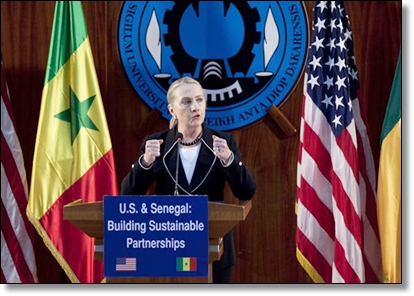Hillary Clinton: Value of Democracy

 |
|
Hillary Clinton, U.S Secretary of State speaks in Senegal Photo courtesy. |
Now, I know there is sometimes an argument that democracy is a privilege belonging to wealthy countries, and that developing economies must put economic growth first and worry about democracy later. But that’s not the lesson of history. Over the long run, you can’t have effective economic liberalization without political liberalization. Without the rule of law, people with a good business idea or money to invest cannot trust that contracts will be honored and corruption punished, or that regulations will be transparent and disputes resolved fairly, and so many will end up looking for opportunities elsewhere, some even migrating out of their countries of origin. Last year, the World Bank reported evidence that respect for economic freedom and civil and political liberties helps explain why some countries achieve better long-term economic outcomes than others. So instead of viewing democratic reform as an afterthought, we see it as key, a key building block of sustainable development.
All of us join the people of Ghana in mourning the passing of President Mills, a good man and a good leader for his country. But we are also celebrating the smooth, peaceful, constitutional transfer of power to President Mahama. The Ghanaian people will head to the polls later this year and will have an opportunity to add another accomplishment to one of Africa’s great democracy stories.
Earlier this year, I had the privilege of attending the second inauguration of President Ellen Johnson Sirleaf in Liberia, a country that only recently emerged from years of war and economic ruin. There were troubling signs that this last election might reignite the flames of conflict, but Liberia’s leaders and its young, democratic institutions proved strong and kept the country on track.
Now I know how hard it can be to keep faith in a democratic system when your preferred candidate or party loses an election. I’ve won elections and I’ve lost elections. I know that boycotting or obstructing is no way to advance an agenda or to solve a problem. It’s a recipe for gridlock and conflict.
I’m often asked, all over the world, how I could agree to serve in President Obama’s Cabinet after we had campaigned so hard against each other. I was trying to beat him, he was trying to beat me, and he succeeded. And I always give the same answer: Because we both love our country. Because that’s what democracy is all about, and that’s what patriotism is all about.
In less than a decade, the number of electoral democracies in Sub-Saharan Africa have fallen from 24 in 2005 to just 19 today. Now, that’s far better than it was 20 years ago, but not nearly good enough.
In Guinea-Bissau, no elected president has successfully served a full five-year term, and this past April a military coup once again disrupted constitutional rule. And we thank Senegal for contributing troops to the ECOWAS stabilization force there. The already weak economy is collapsing. Cashew production is forecast to drop by half. But what is growing? Drug trafficking. Rampant corruption, greed, is taking over. And we see a very troubling trend, that Guinea-Bissau, unless the people of Guinea-Bissau with the help of their neighbors and the international community say no, could become a totally dependent state on drug traffickers from Latin America. What a terrible development.
Mali was, by most indicators, on the right path until a cadre of soldiers seized power a little more than a month before national elections were scheduled to be held. By some estimates, this could set back Mali’s economic progress by nearly a decade. It certainly created a vacuum in the North in which rebellion and extremism have spread, threatening not only people’s lives and the treasures of the past, but the stability of the region. And recent reports from Human Rights Watch raises concern about alleged torture and extra-judicial killings at the hands of the mutineers.
Now the interim President has returned and we encourage all parties to set aside their differences, work to restore democracy, schedule elections by April of next year, preserve the territorial integrity of the country, reject the appeals of violent extremism.
Now, Mali and Guinea-Bissau are just two examples. There unfortunately are more. And in places where jobs are scarce and a tiny elite prospers while most of the population struggles, people – especially young people – can turn their frustrations into social, economic, and political change. That’s the right channel. But they can also be attracted to violence, to conflict, to extremism out of frustration and anger at what they see happening around them.
It is time – it is past time – for all leaders to accept accountability, to treat their people with dignity, to respect their rights, to deliver economic opportunity and services for all. Leaders who hold onto power at all costs, who suppress dissent to enrich themselves, their families, and their supporters at the expense of their own people, who define democracy as one election, one time are on the wrong side of history. We are seeing that in North Africa, and we are seeing everywhere, where people finally say, “Enough. We’re fed up.”
By Hillary Rodham Clinton
U.S. Secretary of State.
